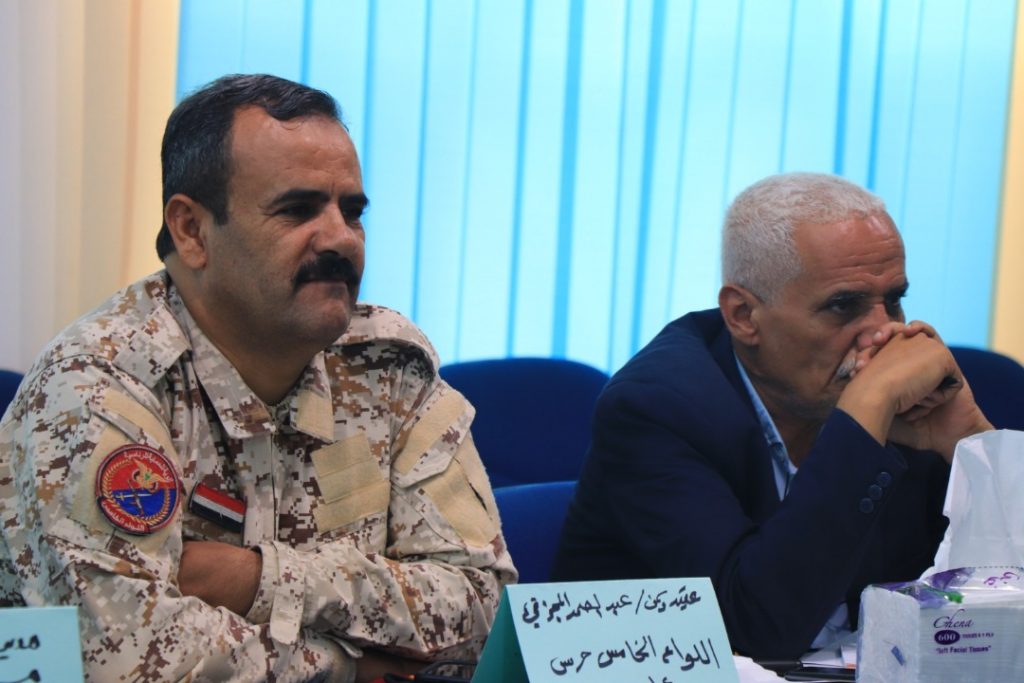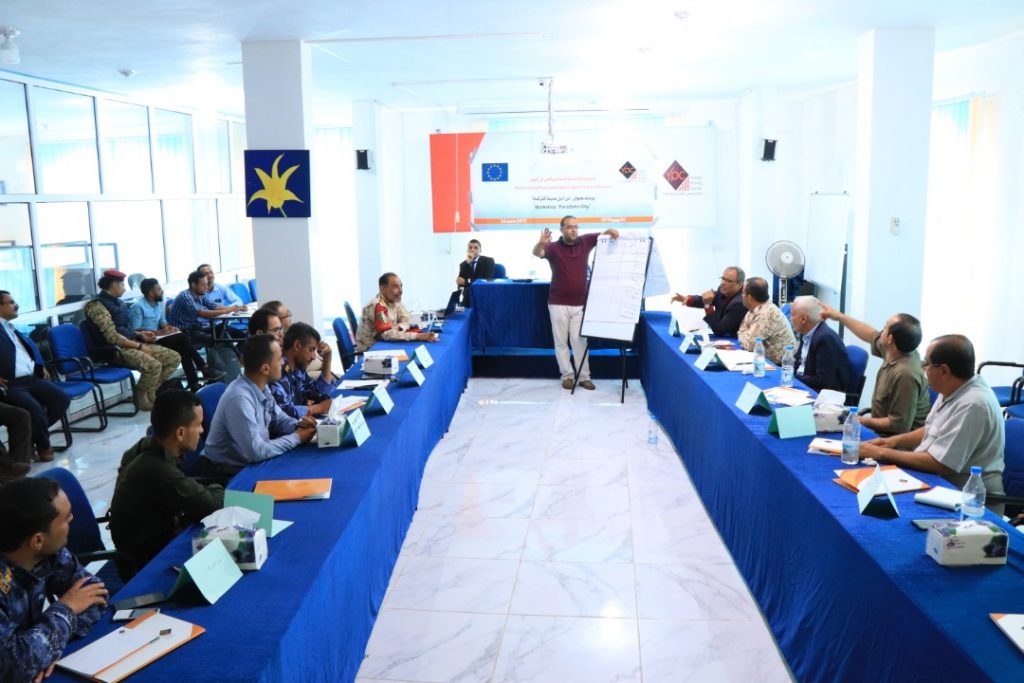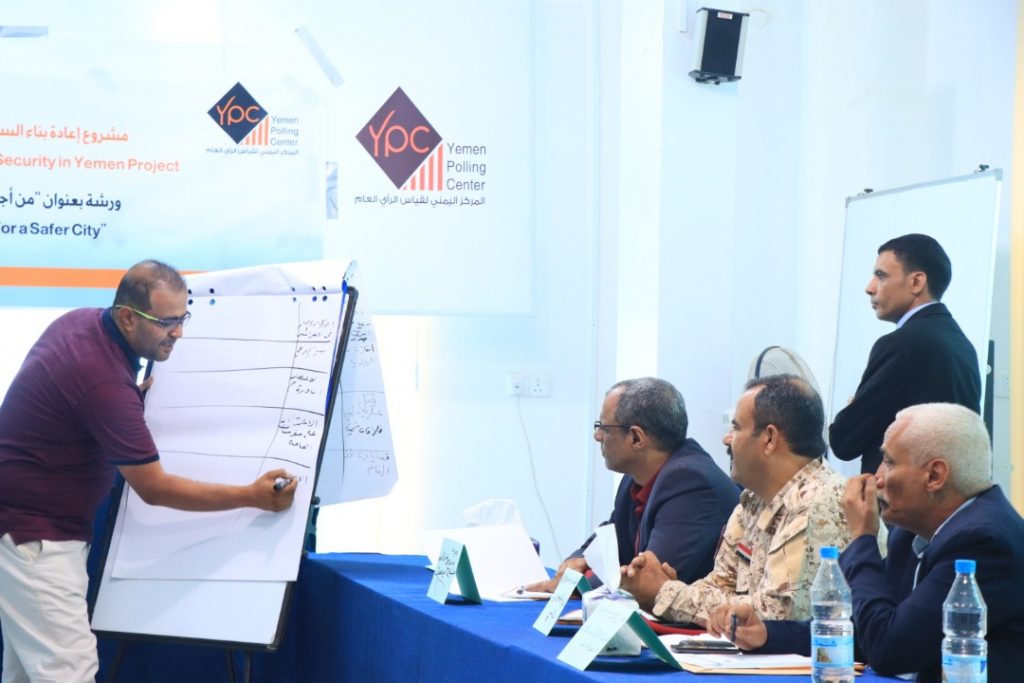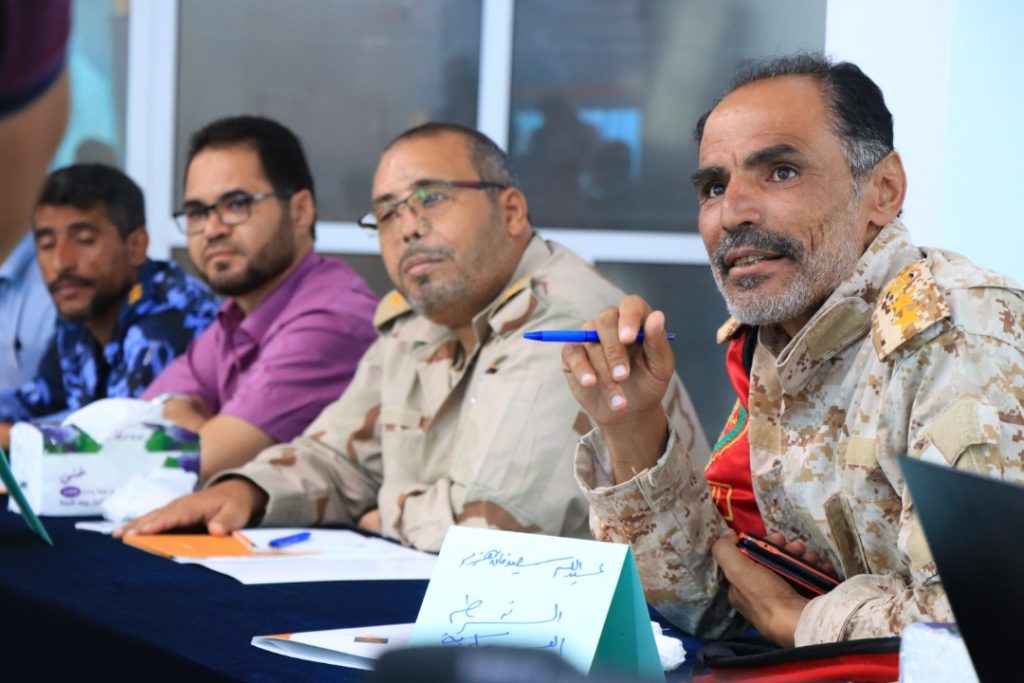YPC
YPC Brings Together Taiz Security Figures to Discuss Cooperation
June 30, 2019
The Yemen Polling Center (YPC) in collaboration with the security authorities in Taiz and with the support of the European Union organized on June 24, 2019, at its headquarters a workshop entitled “For a Safer City”.
Taiz has been making steady progress in re-establishing security and setting up state institutions. According to YPC research, state security providers are slowly developing towards becoming the main security provider yet again. With this workshop, YPC wants to contribute to the improvement of local security, by establishing a platform that will allow security providers – both formal and informal – to start a conversation about cooperation.
The workshop was attended by representatives of the army and security establishment, representatives of the local authority, judiciary and neighborhood authorities. The goal of the workshop was to better understand threats to local security and identify the needs of security authorities to better address such threats. The meeting laid the foundation for better cooperation between security providers in the future.




The workshop was initiated by films from the Badihi campaign that showed the cultural treasures of Yemen, and the human suffering across the country, regardless of political affiliation. The participants were given the opportunity to comment on the film before YPC Vice-President Kamal Moqbil opened the workshop activities with a summary of the overall project. The workshop is part of the project “Re-building Peace and Security in Yemen” implemented by YPC support of the European Union’s Instrument Contributing to Stability and Peace (ICSP).
Moqbil said that this workshop is part of YPC’s constant efforts to address all issues that affect the living conditions of the Yemeni people everywhere in the country, but Taiz in particular and to call attention to them through independent and rigorous research methodology. The workshop was moderated by Maged al-Kholidy, YPC Associate Fellow and leading member of the Organizations Youth Without Borders.
Several topics were discussed during the workshop, which had 2 sessions. The first session of the workshop was devoted to discussing the effects and causes of security threats. In the second session, participants discussed the security providers in Taiz; capacities, authorities, needs and challenges, in addition to the form and mechanisms of cooperation. The workshop was closed by collecting and reviewing participants recommendations.
The meeting will be repeated in July to deepen cooperation between the security providers.
Translator : N/A
Editor : N/A
Photographer : N/A
Donor : N/A
References :
[1]YPC nationwide representative survey, April–July 2019. Data cited in this paper is drawn from this survey unless otherwise indicated.
[2] UN News “Humanitarian crisis in Yemen remains the worst in the world, warns UN” Feb 2019. https://news.un.org/en/story/2019/02/1032811 (Accessed 3 March 2020).
[3] Wadhah Al-Awlaqi and Maged Al-Madhaji, Rethinking Yemen’s economy: Local governance in Yemen amid conflict and instability, July 2018. https://devchampions.org/files/Rethinking_Yemens_Economy_No2_En.pdf (Accessed 8 March 2020); Mansour Rageh, Amal Nasser, and Farea Al-Muslimi, “Yemen without a Functioning Central Bank: The Loss of Basic Economic Stabilization and Accelerating Famine,” Sana’a Center for Strategic Studies, November 2016. http://sanaacenter.org/publications/main-publications/55 (Accessed 23 May 2018).
[4]Data source: OCHA, “Humanitarian needs overview 2019: Yemen”, December 2018. https://yemen.un.org/sites/default/files/2019-08/2019_Yemen_HNO_FINAL.pdf (Accessed 11 March 2020).
[5] Final report of the Panel of Experts on Yemen, addressed to the President of the Security Council, January 2020. https://undocs.org/S/2020/70 (Accessed 11 March 2020).
[6] Mareike Transfeld, “Implementing Stockholm: The Status of Local Security Forces in al-Hodeidah,” YPC Policy Report, Yemen Polling Center, Policy Report, November 2019. http://www.yemenpolling.org/Projects-en/ICSP_EU_HodeidahReport2019November30.pdf (Accessed 16 February 2020).
[7] Mareike Transfeld and Shaima Bin Othman, “The State of the Police in Western Yemen”, YPC research debrief, Yemen Polling Center, Research Debrief, January 2020. https://www.yemenpolling.org/4325/ (Accessed 16 February 2020).
[8] Amnesty International, “Yemen: Fierce new offensive displaces tens of thousands of civilians from Hodeidah” May 2018. https://www.amnesty.org/en/latest/news/2018/05/yemen-fierce-new-offensive-displaces-tens-of-thousands-of-civilians-from-hodeidah/ (Accessed 5 March 2020).
[9] Maged Sultan, Mareike Transfeld and Kamal Muqbil, “Formalizing the Informal State and Non-State Security Providers in Government-Controlled Taiz City,” YPC Policy Report, Yemen Polling Center, July 2019. https://yemenpolling.org/advocacy/upfiles/ICSP_EU_FinalTaizReport2019July19.pdf (Accessed 16 February 2020).
[10] Nadwa al-Dawsari , “Tribal Governance And Stability In Yemen “, The Carnegie papers, Carnegie endowment (April 2012). https://carnegieendowment.org/files/yemen_tribal_governance.pdf (Accessed 5 March 2020).
[11]CIVIC, “We Did Not Know If We Would Die From Bullets Or Hunger” Civilian Harm and Local Protection Measures in Yemen “, Jan 2019, https://civiliansinconflict.org/wp-content/uploads/2020/01/YEMEN_BulletsorHunger_FINAL_PROOF.pdf (Accessed 5 March 2020).
[12] Fatima Saleh and Ahmed al-Sharjabi “Institutional Prerequisites for the STC “Coup” in Aden and Perspectives on the Jeddah Deal” , research debrief, Yemen Polling Center, Oct 2019. https://www.yemenpolling.org/institutional-prerequisites-for-the-stc-coup-in-aden-and-perspectives-on-the-jeddah-deal/ (Accessed 16 February 2020).
[13] Human Rights Watch, “Yemen: Riyadh Agreement Ignores Rights Abuses”, December 2019, https://www.hrw.org/news/2019/12/12/yemen-riyadh-agreement-ignores-rights-abuses Accessed 5 Mar 2020; Human Rights Watch, “Yemen: UAE Backs Abusive Local Forces” June 2017.
- © Copyright 2012 - 2024
- All Rights Reserved
- Yemen Policy Center
- Impressum - Legal Notice
- Privacy Policy
